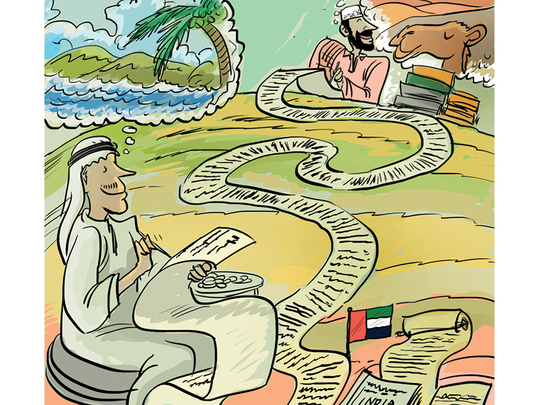
The relations between the UAE and India are rooted in history and engraved on the collective memory of Emiratis. In the old days, travelling meant to our fathers and grandfathers either going to Makkah and Madinah in Saudi Arabia to perform Umrah or the Haj, or to India, specifically Bombay, now called Mumbai.
In our ancestors’ time, the aim of travel abroad was for treatment, trade and tourism. Emiratis also went to India for another reason, namely to bolster ties with Indians through marriage.
Mumbai was the main base for Emiratis who used to stay there before travelling to other Indian cities such as Bengaluru, and Hyderabad, which was an Indian, Arab and Islamic cultural hub along with Mumbai.
When Emiratis recall their memories about India, they also remember some of their own history, which is closely attached to that of India, a history that can be told by the sands of the Emirati desert and the waves of the sea.
India means for Emiratis the charm of the east, the glittering sun and home to many kinds of spices, and also a destination that meant the land of dreams. This shows that there are intimate and long-standing bonds between the two nations. It bears the smell of the past and ambitions for the future.
The historic visit to the UAE by the Indian Prime Minister Narendra Modi marked yet another milestone in the distinguished UAE-India relations, and ushered in an era of greater progress and a brighter future for both peoples.
Modi’s visit fulfilled the hopes and aspirations of Emiratis and Indians who are as enthusiastic as their leaders to take this outstanding relationship towards broader horizons. The visit reflects the love and yearning for the old days, while looking to the future in a symphony that combines the beautiful past, present and future, as if the late poets Salem Ali Al Owais and Sultan Ali Al Owais were still alive today, jointly composing a poem about the UAE’s love for India, as well as about trade and cultural relations.
When one recalls these beautiful days and events of the 1930s, 1940s and 1950s, it brings to mind the visit by India’s iconic poet Rabindranath Tagore to Dubai in the early 19th century, a red-letter day in the UAE’s modern history that cannot be overlooked by history.
As Emirati poets wrote poems and letters of love and yearning about India, there are also Indians from the community in the UAE who wrote their poems, stories and novels. Immense efforts were exerted by Emirati and Arab poets, writers and critics to translate some of these literary pieces written by expatriate Indians in the UAE over the past few decades.
It would be a good thing if these literary works were translated and introduced to Arab readers who could gain an insight into Indian literature.
Among the first Emirati and Arab literary figures who called for translating Indian poems and novels were the late Emirati poet and translator Dr Shihab Ganem, and Lebanese poet and translator Ahmad Farhat, who lived many years in the UAE before returning home.
Collective effort
The Indian premier’s visit came as a reminder for us to revive this great literary project involving the translation of literary works by Indians who were and are still living in the UAE.
Such an inspiring project requires UAE institutions to work collectively and contribute to this ambitious literary initiative.
Emirati poet Khalid Al Rashid opted to migrate to India where he chose to live under the apple trees in the Himalayas. Another example is Dr Maryam Al Shanasi, president of Emirates Publishers Association, who travelled to India where she met Indian authors and intellectuals and gave lectures on UAE literature. She also organised seminars dedicated to Indian literary critics and intellectuals, and speaking about the UAE literary and cultural scene.
Institutional efforts by both sides are required to revive this highly important cultural project and bring it to light, especially after the Indian prime minister’s visit to the UAE and his talks with Emirati leaders. This visit marks a new turning point in the UAE-India relations — where culture must always be present in this distinguished relationship.
Culture must be present as strongly as politics and economy so as to ensure that the relationship will see greater progress and go beyond formalities.
This proposed project should be supported by Emirati and Indian cultural bodies and centres as well as by social centres, universities and associations.
God bless the lion of the sea, Emirati seaman Ahmad Bin Majid, one of the most famous Arab navigators in history, who was born in Julphar, now known as Ras Al Khaimah.
He became famous in the West as the navigator who has been associated with helping Vasco da Gama find his way from Africa to India, as also supported by the findings of His Highness Dr Shaikh Sultan Bin Mohammad Al Qasimi, Supreme Council Member and Ruler of Sharjah.
No doubt that on the road to India, there were ships that found their way, and others that might have sunk.
However, this long-standing intimate relationship still exists, and will get even stronger.
Habib Al Sayegh is the Editor-in-Chief of Al Khaleej newspaper and a prominent UAE commentator and poet.








